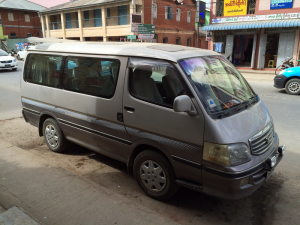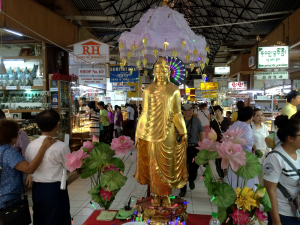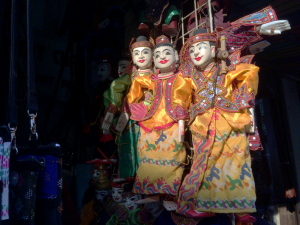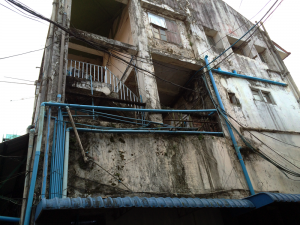28 November 15 – Saturday – DAY TWENTY-TWO
Nyin Zar Wai, that bright young sweetheart, gets up from her crash pad at the hotel at 4:45 AM just to see us off. She hugs us all, but especially Cecilia – no one is sure why. Is it because Cecilia is enormously charismatic and who doesn’t love her? Is it that these young Burmese women recognize in Cecilia a determined and capable woman, the “boss” of this production, and identify with her? I’d like to think so when I consider Myanmar’s future. Nyin Zar Wai gives us a bag of freshly roasted peanuts for our journey.
Were off, with our 16+ bags in the van (now piloted by someone else, not Thiha, who lives in Pyin Oo Lwin) and all personnel and snacks in Salai’s vehicle. The first few hours we all snooze uncontrollably. Minshi actually transfers to the equipment van certain that he can stretch out on bags and sleep there. I’m not so sure about that. The rest of us are mildly irritated – it’s as if he’s trying to avoid being with us even one second longer. He did spend an enormous amount of time complaining during this shoot, so we know that he is unhappy. We can never get Minshi to admit that he’s irritated with us. In any event, it’s a bit sour especially when we’re so close to being home.

Soon enough, Salai is belting out Burmese easy listening music so that he can stay focused. Slowly we are all rising sleepily. Except Cecilia, who is just plain wiped out.
The open, empty road stretches out in front of us. It’s a long drive, and reminds me of the empty space between certain U.S. cities in the midwest and southwest. A trip through Texas has just about as much excitement. We eat tangerines and bananas. Ah, have I not yet spent enough time extolling the virtues of the Myanmar banana? It is a much different species. The “American” banana, the Cavendish, which is all grown in South and Central America, is bred for heartiness and travel, not for deliciousness. The skin is made tough, the fruit not easily bruised, and brown spots delayed. All of which make Cavendish bananas taste practically sour when put up against Myanmar bananas. I will miss this fruit, but more importantly, I wonder if eating a regular ole banana will just make me sad from now on.

After a roadside stop at the Burmese equivalent of a truck stop restaurant (called “FAMOUS”) for a breakfast of Shan noodles (we sure do eat a lot of Shan noodles) we’re on the road again. We do this all day – it is a 10 to 12 hour drive. But by 3 PM we make it to Yangon with only enough time to rush off to the market and buy more gifts for the folks at home. It’s the same big market Minshi and I visited when we came with Jennifer to change money – the Bogyoke Market. I feel like we see the same people from before, even though weeks have passed – it’s like nothing has changed.

The hotel is fancy and is done in the Western-style – it’s almost anodyne. It reminds me of a hotel in San Francisco or L.A. It’s an immediate culture shock. But this is just the endgame now. Nothing to do but sleep and go to the airport tomorrow. It’s like a bizarre purification ritual by which we begin to process what we’ve just been through. And process we do, Cecilia and I return numerous times to the questions about Tinmar Aung.
There are physical barriers for us to do anything good for her. We cannot send her money. We could give money to the orphanage, which we’ve done. That will improve the lives of all the orphans, so that is good. We’ve met a lot of them and we like them, so helping everyone is good. But short of being millionaires we cannot fundamentally change the lives of 58 children all at once.
There are ethical barriers, too. Imagine that Cecilia and I could adopt Tinmar Aung – which we have certainly entertained, even if just as a mental exercise. If we could somehow wrest her from the people who are actually her parents, we still do not know what that relationship is like. Are they no good and out of the picture, or will she always pine for them in some way? Suppose we could fly away with her. She is ten years old, and speaks only Burmese. No one we know speaks Burmese, leaving her alone with her thoughts and struggling without any communication. Sure she’s young, and she’d pick up the language. Tinmar Aung is a smart girl. But how far back does that set her education before she learns English? A couple years? So now we have a twelve or thirteen year old, who should be socialized with peers, who should have friends. And this one would have been dealing with language and culture changes that are significant for grown adults, much less a young girl who has already had some instability in her life. What would we actually be doing for her? Sure, we can feed and clothe her; land of the free home of the brave. She can learn to play XBox and have a cell phone with a Facebook account. Is any of that really worthwhile?
The only thing we could realistically do to improve the life of Tinmar Aung is if we stayed in Myanmar. Saw her every day. Took her out for visits. Helped build things for the orphanage. Created a stable environment for her right where she is. Thus, very little can we do for her, outside of radically altering our own lives. It’s a sacrifice we could make for someone who has never asked for it, and who might not even want it.
Of course we discuss with Gavin how to watch her progress through life, what kind of options we could have for setting money aside for her, how we could open accounts for her that would come due when she is old enough to access them. But these things are still weighing heavily on us.
We sit down to a lovely dinner in Yangon with Salai’s family – we can feel everything is winding down. There is now only the decompression and coma of transcontinental flight.

